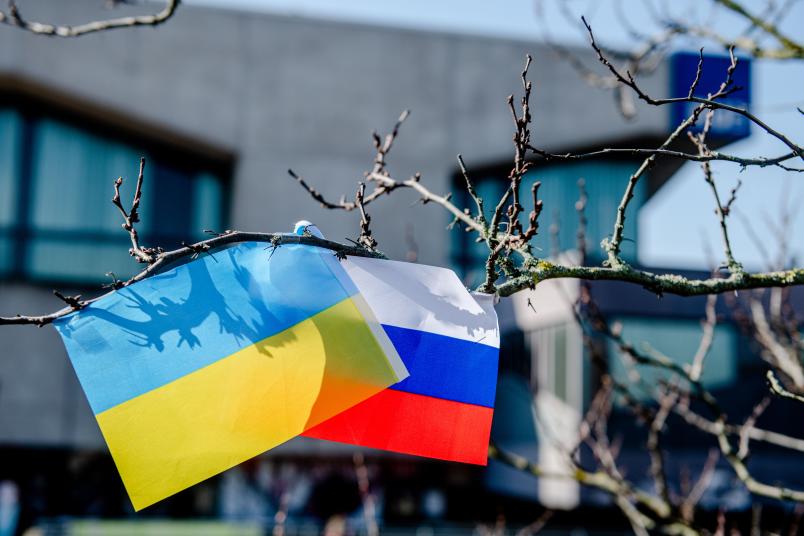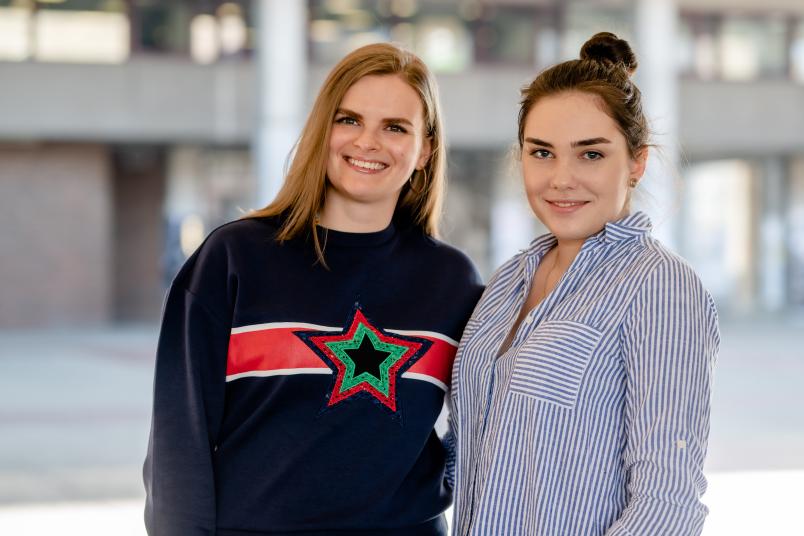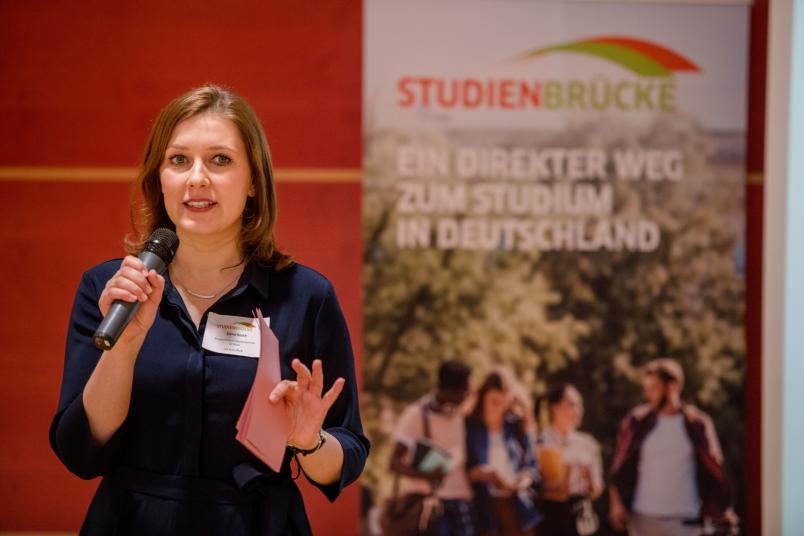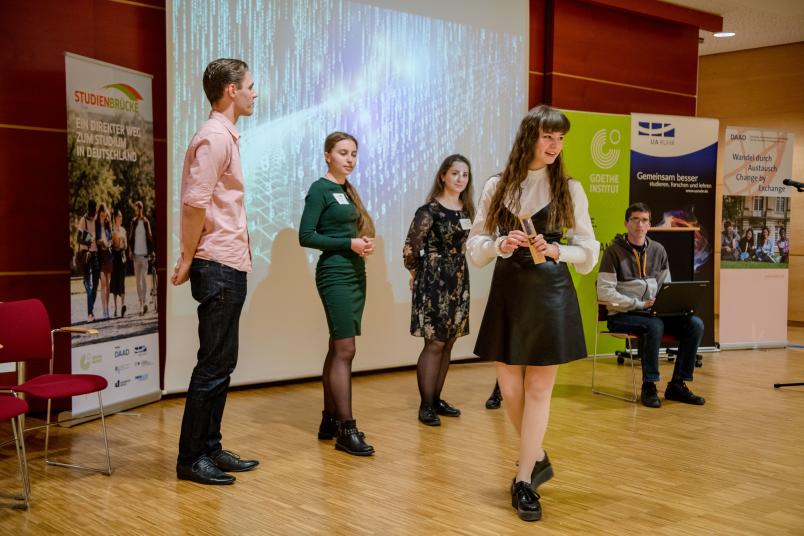Studienbrücke Solidarity in difficult times
The Studienbrücke programme that enables students from Russia and Ukraine to study in German continues – and for good reason. Participants share their experiences.
While the war in Ukraine is raging, more and more voices are demanding that all relations with Russia be broken off. The Studienbrücke programme, through which highly committed and qualified students from Russia, Ukraine and Belarus (and other countries) study at RUB and at other partner universities, shows that this course of action wouldn’t always make sense and might even affect the wrong people. Participants and organisers of the programme speak of tremendous willingness to help and of solidarity.
“Studienbrücke is a good example of solidarity in difficult times,” says Elena Resch, who is in charge of the programme at the University Alliance Ruhr (UA Ruhr) and heads the UA Ruhr’s Eastern Europe/Central Asia Liaison Office.
An important distinction
The official statement of the Ruhr University Bochum is in line with the position of important actors in the field of international scientific cooperation. They include, for example, the German Academic Exchange Service (DAAD), the German Research Foundation (DFG), the European Union, the Federal Government and, of course, the Ministry of Science NRW. It is particularly important to distinguish between institutional cooperation and individual support. RUB is currently putting its partnerships and cooperations, which are usually institutional in nature, on hold. This also applies to the activities of the Liaison Office of the Ruhr University Alliance (UA Ruhr) in Moscow (see info box below).
However, it is still possible for individuals to take advantage of mobility programmes, even within projects, as they are still eligible for funding – for example, through DAAD funds.

This applies as long as it is possible to obtain visas for Germany.
Monika Sprung
“This applies as long as it is possible to obtain visas for Germany,” points out Monika Sprung, head of the RUB International Office. “RUB would use these options if requested – if only to allow vulnerable members of Russian academia, who have taken high risks by participating in anti-war protests, to leave for Germany. The same applies to Belarus.” The RUB Rectorate stresses explicitly that Russian students – especially those who oppose Putin – can also be severely impacted by the situation.
Studienbrücke is a special programme that promotes individual mobility. Supported by the DAAD and the Goethe-Institut, it brings outstanding German-speaking students to partner universities. The students finance their stay themselves – without the involvement of any institutions in Russia or in other Eastern European countries. Through this programme, around 50 Ukrainian and 90 Russian students, as well as 30 more from other countries, are currently enrolled in STEM degrees at RUB.

The relationship between the Russian and Ukrainian Studienbrücke students is very good.
Anastasiia Sliusar
“The relationship between the Russian and Ukrainian Studienbrücke students is very good,” stresses Anastasiia Sliusar. “Current events haven’t changed that.” Sliusar is from Russia, 22 years young, a graduate of the programme and currently a graduate assistant at RUB. She supports the project coordination and the activities of the current participants. She speaks neither of Russians or Ukrainians, nor of participants, but exclusively of “Studienbrücke students”. The programme brings people together.
Anastasiia Sliusar tells how the willingness to help and solidarity have increased after the initial shock. “We packed aid packages together, helped out as interpreters at the Workers Welfare Association and got involved in many different ways. It’s also important that we spend time together: We cook and exercise together, share information from home and update each other.”
Sliusar has received this feedback from two Studienbrücke students from Ukraine:
Sofiya Kostiukovska from Charkiw says (9 March 2022):
“I’m very grateful that my fellow students from Russia always show sympathy and concern for all Ukrainians. And also for the fact that I have not yet experienced a single case of aggression between Ukrainian and Russian Studienbrücke participants since the beginning of the war. On the contrary, we support not only each other, but also the people who need help either in the war zones or as refugees. We regularly take part in the Ruhr-Universität’s fundraising campaigns as well as in protests.
In addition to all that, each of us covers the most important news from the war daily on our social media. We do it first of all to help suppress the Russian state propaganda and to make the Russian people finally see the situation in a realistic light. Secondly, we want the EU to talk about it too, so that the government of Russia, and the president in particular, will be condemned by the international court for its many violations of the law of war.

We are immensely grateful for the generous response all over the world.
Sofiya Kostiukovska
“I’d like to personally address the readers and anyone who is not sure whether or how to contribute to the resolution of the situation. We are immensely grateful for the generous response all over the world. Every small donation, every repost, every volunteer counts for the Ukrainian people. But it is equally important to keep people up to date about the current situation and to show your support to the people in need. This is why I’d like to encourage everyone to contribute to the joint effort, and to thank all those who have helped. We will only achieve peace in Ukraine as a community!”
Tetiana Kanderal from Kyiv says (8 March 2022):
“It’s hard to believe, but it is already the 13th day of war in my country. I am Ukrainian and very far from my family. The only help I can give at the moment is emotional support and collecting humanitarian aid as well as making relevant contacts. I study in Germany and I’m very happy that my whole social circle consists of students from different countries. This critical and difficult situation has brought students from different countries together to help the people in my home country. When we attend rallies, bring food and supplies to the volunteers, we all get together, support each other and exchange information.”

We don’t waste time arguing, we use it to help.
Tetiana Kanderal
There are, of course, always people who don’t share the opinion of the majority or who even support the war, but we don’t waste time arguing, we use it to help. I pray every day and believe that this nightmare will soon end and we will continue to live in peace. I am grateful to all countries with all my heart!”



